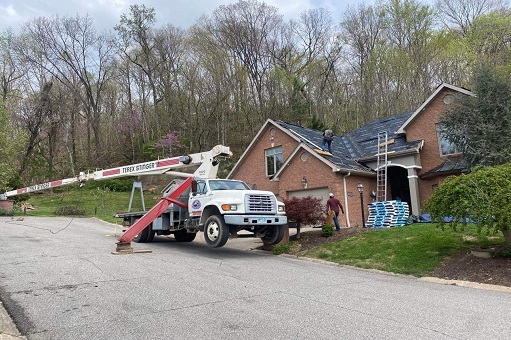If you’re on the hunt for top-quality roofing materials, you’ve come to the right place. Whether you’re a homeowner looking to replace your old, worn-out roof or a contractor in search of the best materials for your next project, finding the right roofing supplies can be a daunting task. But fear not!
In this comprehensive guide, we’ll walk you through everything you need to know about selecting the perfect roofing materials for your needs.
From understanding the different types of roofing materials to tips for finding quality suppliers near you, we’ve got you covered. So grab a cup of coffee, sit back, and let’s dive in!
Asphalt Shingles
The most popular type of shingle, asphalt shingles are cost-effective and easy to install. They come in a variety of colors and styles, making them a versatile choice for any home.
Clay and Concrete Tiles
These roofing materials are known for their durability and aesthetic appeal. Clay and concrete tiles are a popular choice for homeowners who want a Mediterranean or Spanish-style look to their home. They are also resistant to fire, insects, and rot, making them a great choice for many different climates
Slate roofing
Slate shingles are a premium option for homeowners who want a high-end, luxurious look. They are made from natural stone and are incredibly durable, lasting up to 100 years.
Wood shakes and shingles
These roofing materials are made from natural wood and have a rustic, traditional look. While they are attractive and environmentally friendly, they are also expensive and require a lot of maintenance to keep them in good condition.
Factors to Consider When Choosing Roofing Materials
When choosing roofing materials, there are several important factors to consider. Here are some key factors you should keep in mind:
i. Climate
Your local climate plays a significant role in the type of roofing materials that are best for your home. For example, if you live in an area that experiences heavy snowfall or rainfall, you’ll want to choose roofing materials that can withstand these conditions.
ii. Your Budget
Roofing materials can vary significantly in cost. It’s important to determine your budget before you begin shopping for materials so that you can find options that meet your needs without breaking the bank.
iii.Aesthetic Appeal
Your roof is a significant part of your home’s exterior. Choosing roofing materials that complement your home’s architectural style and enhance its curb appeal can add value and beauty to your property.
iv. Longevity And Durability
The lifespan and durability of your roofing materials are crucial factors to consider. Quality materials that are designed to last can save you money and hassle in the long run by reducing the need for frequent repairs or replacements.
V. Maintenance Requirements
Some roofing materials require more maintenance than others. It’s important to consider the time and cost associated with maintaining your chosen materials to ensure that they’re a good fit for your lifestyle and budget.
Vi. Energy Efficiency
Choosing energy-efficient roofing materials can help reduce your home’s energy consumption and lower your energy bills. Look for materials that are designed to insulate your home and reduce heat transfer.
Vii. Local Building Codes
Be sure to check your local building codes and regulations to ensure that your chosen roofing materials meet the necessary requirements and are approved for use in your area.
The Best Tips for Selecting The Best Roofing Materials for Your Home or Business
Choosing the right roofing materials can be a daunting task, but here are some tips to help you select the best materials for your home or business:
i. Determine Your Needs
Consider your specific needs, such as durability, maintenance requirements, energy efficiency, and budget. Knowing what you need can help you narrow down your options.
ii. Consider The Climate
The local climate is a crucial factor in selecting roofing materials. For instance, if you live in an area with high winds, you’ll want to choose a material that is wind-resistant.
iii. Research Different Materials
Conduct thorough research to learn about the different types of roofing materials available. Compare the pros and cons of each material to determine which one is the best fit for your needs.
iv. Check For Quality And Warranties
Look for roofing materials that are made with high-quality materials and come with warranties. This will give you peace of mind and ensure that your investment lasts for years to come.
v.Think About Aesthetics
Consider how the roofing materials will look with the rest of your home or business. Choose materials that complement the overall style and design of your property.
vi. Hire a reputable roofing contractor
It’s important to work with a reputable roofing contractor who can guide you through the selection process and install your roof properly. Look for a contractor with a proven track record and positive customer reviews.
vii. Consider the environment
Think about the environmental impact of your roofing materials. Choose materials that are sustainable and eco-friendly, such as recycled materials or those that are designed for energy efficiency.
Conclusion
Choosing the right roofing materials for your home or business is crucial for protecting your property, enhancing its aesthetic appeal, and ensuring energy efficiency. By considering factors such as climate, budget, durability, maintenance requirements, and aesthetics, you can make an informed decision and select the best materials for your needs.
Additionally, working with a reputable roofing contractor like Mr Roofers in OH, KY, or WV can help you make a responsible and sustainable choice.
The most common types of roofing materials include asphalt shingles, metal roofing, tile roofing, and wood shakes.
While some roofing materials can be installed by homeowners, it’s generally best to hire a professional roofing contractor to ensure proper installation and to avoid potential safety hazards.
Yes, there are several eco-friendly roofing materials available, including recycled shingles, metal roofing, and clay tiles. These materials are designed to reduce energy consumption and environmental impact.
The cost of replacing a roof varies depending on the size of the roof, the type of material, and the complexity of the installation. It’s best to get a quote from a reputable roofing contractor to get an accurate estimate.
Signs that it’s time to replace your roof include cracked or missing shingles, leaks, and visible damage or wear and tear. If you’re unsure, it’s best to have a professional roofing contractor inspect your roof.
The lifespan of roofing materials varies depending on the type of material and the quality of installation. Asphalt shingles typically last between 15 and 30 years, while metal roofing can last up to 50 years or more.







0 Comments